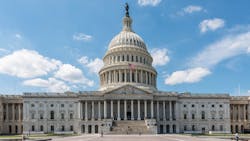APTA members participate in virtual fly-in
More than 140 phone and video conference meetings were held between transit industry professionals and individual Congressional offices and staffers during the American Public Transportation Association’s (APTA) virtual fly-in on May 19.
APTA members urged Congress to provide an additional $23.8 billion in emergency COVID-19 funding. The number includes $19 billion through the Emergency Relief Program and $4.75 billion through certain formula programs. The emergency relief funding would be distributed proportionally to all public transit agencies with a demonstrated need and would be provided at a 100-percent federal share.
The funding request is in addition to the $25 billion provided by the Coronavirus Aid, Relief and Economic Security (CARES) Act. It is also based on an economic analysis performed by EBP, Inc., that determined the industry could experience a $48.8-billion shortfall. The House passed the Heroes Act on May 15 that would provide an additional $15.75 billion to the transit industry and has been moved over to the Senate for consideration.
“We appreciate members of Congress and their staffs taking the time to meet with our public- and private-sector members and discuss the essential role public transportation is playing in keeping our society working, and the indispensable role it will play in America’s social and economic recovery,” said APTA President and CEO Paul P. Skoutelas. “Despite the ongoing challenges presented by the COVID-19 crisis, dedicated APTA members carved out time in their schedules to advocate on behalf of the critically essential public transportation industry.”
In these meetings, APTA members reiterated the vital role public transportation has played in their communities during the COVID-19 pandemic, bringing healthcare professionals to the frontlines, delivering groceries and medicine to at-risk populations and connecting essential workers to their places of work.
APTA also urged Congress to provide the public transportation industry with long-term certainty by enacting the Surface Transportation Authorization Act prior to its expiration in September.
